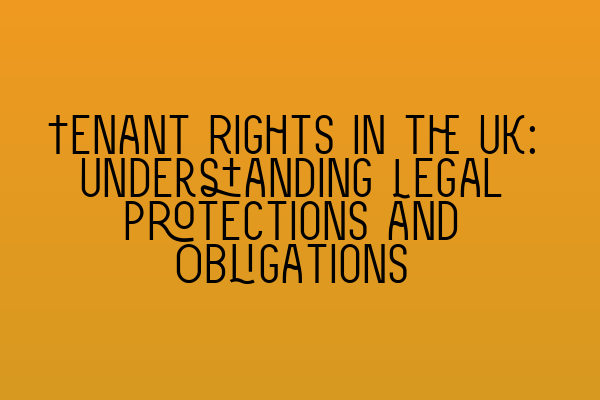Tenant Rights in the UK: Understanding Legal Protections and Obligations
As a tenant in the UK, it is important to have a clear understanding of your rights and the legal protections available to you. This knowledge will empower you to assert your rights confidently and navigate any tenancy issues that may arise. In this article, we will explore the key aspects of tenant rights in the UK, including the obligations of landlords and the legal mechanisms for resolving disputes.
1. Assured Shorthold Tenancies (ASTs)
Assured Shorthold Tenancies (ASTs) are the most common type of tenancy in the UK. Under these tenancies, tenants have a range of legal protections, including the right to live in the property and the right to be protected from unfair eviction.
2. Security of Tenure
One of the significant benefits of an AST is the security of tenure it provides. As a tenant, you have the right to occupy the property for the agreed-upon period, as long as you meet your obligations under the tenancy agreement. This means that your landlord cannot evict you without following the proper legal channels, such as obtaining a possession order from the court.
3. Deposit Protection
When entering into an AST, your landlord is required by law to protect your tenancy deposit in a government-approved deposit protection scheme. This ensures that your deposit is safeguarded during your tenancy and that it will be returned to you at the end of the tenancy, provided you have met all the terms of the agreement. If your landlord fails to protect your deposit, you may be entitled to compensation.
4. Repairs and Maintenance
As a tenant, you have the right to live in a property that is safe and in good repair. It is your landlord’s responsibility to ensure that the property meets certain minimum standards, such as having a working heating system and secure doors and windows. Your landlord should also address any necessary repairs in a timely manner. If your landlord fails to meet these obligations, you can report the issue to your local council’s environmental health department or seek legal advice.
5. Rent Increases
Your landlord may increase the rent during your tenancy, but they must follow specific rules. For ASTs, landlords can only increase the rent once a year and must give you at least one month’s notice (or longer, depending on the rent increase percentage). If you believe that the rent increase is unreasonable, you have the right to challenge it. Seeking legal advice can help you understand your options and negotiate with your landlord.
6. Right to Reasonable Notice
If your landlord wishes to regain possession of the property, they must provide you with reasonable notice. The notice period will depend on various factors, such as the length of your tenancy and the reason for the eviction. Generally, for ASTs, your landlord must give you at least two months’ notice.
7. Dispute Resolution
If you have a dispute with your landlord, it is recommended to first try to resolve the issue amicably through open communication. However, if you are unable to reach a resolution, there are several options for seeking legal remedies. The first step is often to engage in Alternative Dispute Resolution (ADR), such as mediation or negotiation. If ADR is unsuccessful, you can escalate the matter to the courts.
It is essential to seek legal advice if you find yourself in a tenancy dispute. A qualified solicitor can guide you through the process and ensure that your rights are protected.
Conclusion
Understanding your rights as a tenant is crucial for a positive and successful tenancy experience. By knowing your legal protections and obligations, you can advocate for yourself and maintain a healthy relationship with your landlord. If you require further information or professional assistance, our team at SQE Property Law & Land Law is dedicated to helping tenants navigate the complexities of UK tenancy law.
Related Articles:
SQE 1 Practice Exam Questions
SQE 1 Practice Mocks FLK1 FLK2
SQE 2 Preparation Courses
SQE 1 Preparation Courses
SRA SQE Exam Dates
